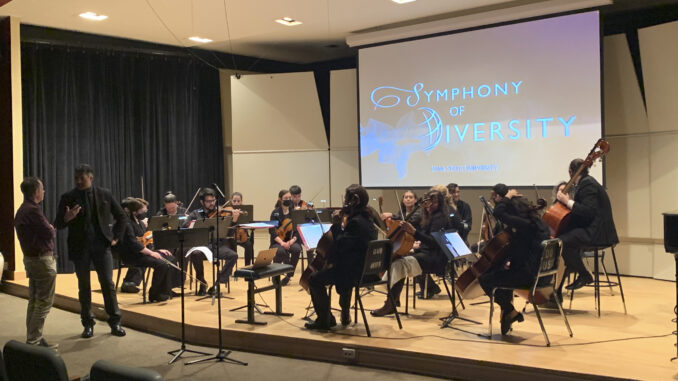
by Mary Liz Flavin | news editor
April 21, 2022
The orchestral music swelled with intensity and emotion as photos of historical musical figures were shown behind the performers. The traumas of the past, the expression of overcoming great challenges and struggles were represented through both spoken word and musical pieces during the Symphony of Diversity: A Thousand Thunderbolts, performed by the Chamber String Orchestra of Iowa State University.
Classical musicians have historically been eurocentric, however this concert brought black classical artists to center stage to receive the recognition. This unique performance was held in the PNC Recital Hall on Wednesday April 20, and was led by Jonathan Govias, conductor of the Iowa State chamber string orchestra. The show honored the victims of the 1921 Tulsa Race Massacre for its 100th anniversary — showcasing the struggles of Black Americans in the United States with spoken word and Black classical compositions.
“I am not just a musician, I am a citizen. I advocate for music but also am an advocate for my fellow man, and this is as much a part of my mission as it is to teach music like Beethoven,” Govias said. “To bring it to the students here, I hope they walk away with the sense that they are empowered as musicians and citizens to affect change.”
The reflection of the music and speakers showcased 100 years worth of suffering for Black Americans in the United States. Several classical composers and musicians such as Dorothy Rudd Moore, Jessie Montgomery, Oscar Peterson, Florence Price and George Walker were represented. Their pictures were shown throughout the duration of the show in conjunction with the musical piece they created.
Laced in between musical compositions, spoken word portions captured the audience by reiterating ideas and experiences from the Black civil rights movement. Ida B. Wells, Frances Ellen Watkins and B.C. Franklin all brought to life those ideals both from the past and into the current day.
Words from Wells, an activist during the anti-lynching crusade in the U.S., were expressed via a pre-recorded video. According to Wells, in marking the 30 years of its existence, the inhumane butchering of more than 10,000 men, women and children by shooting, drowning, hanging and burying them alive showcased the example of lynching mania that spread through the north and midwest.
“The first statute of this law was written in the blood of thousands of brave men who thought that if a government was good enough to create kinsmanship it was strong enough to protect it. The national law was short-lived and illusionary. There was an unwritten law that justified any means to resist it,” Wells said.
Wells focused on the idea of the unwritten law, in which lynching, the persecution of Black Americans, and other forms of inhumane conduct was permitted. It was a time in which little was done to aid those who were being oppressed, and the narrative of the majority progressed. This left one class of individuals to be at the mercy of another.
Another speaker expressed the words of Franklin, known for his work defending the survivors of the 1921 Tulsa Race Massacre. Franklin described his experience as the lull before the storm and told a personal narrative about a mob that came to his town.
“The sounds from the thousands and thousands of guns were deafening. I thought of another saying, ‘he saved those but himself he cannot save.’ It seems so applicable to my race. No, we were unable to save ourselves. The sidewalks were covered with burning turpentine balls, I knew all too well where they came from. I paused and waited for a time to escape,” Franklin said.
What began as a normal day ended in travesty. It began with the sound of bullets and was later followed by fire. Franklin sought shelter at his office, to which he later had to escape. He was surrounded by buildings that were set ablaze and chaos. The music that followed in the program reflected the chaos that Franklin experienced as well as the slowing of time expressed in his statement ‘during that day I lived 1000 years.’
Benjamin Bender, associate professor of music and chair of the Diversity, Equity, Inclusion and Access Committee, stressed the importance of representation through music. Prior to the concert Govias visited the music history as well as musicology class for the juniors and held discussions that tackled the rationale behind music and diversity.
“I think the pairing of the music with the spoken word was really very powerful. It’s one thing to read words on a page but it’s another to hear them spoken so passionately with meaning by current civil rights activists,” Bender said. “To have musical spaces in between with such thoughtful selections and to provoke reflection through music is one of the best things music can do.”
The music allowed for expression in the ways words could not. The spoken word allowed for clarity in remembering the events of the past. Together the two worked in tandem to create a somber, yet unforgettable experience.
Faith Foster, first violinist for the Iowa State Chamber String Orchestra, both played and conducted in the performance. Foster said that music and performances, like the one for Duquesne University, is her way of contributing to movements and issues that society faces today.
“It’s not a fun show but an important one,” Foster said. “We address uncomfortable topics and then being able to take that emotion that the words generate and put that into the music, that is really special.”



